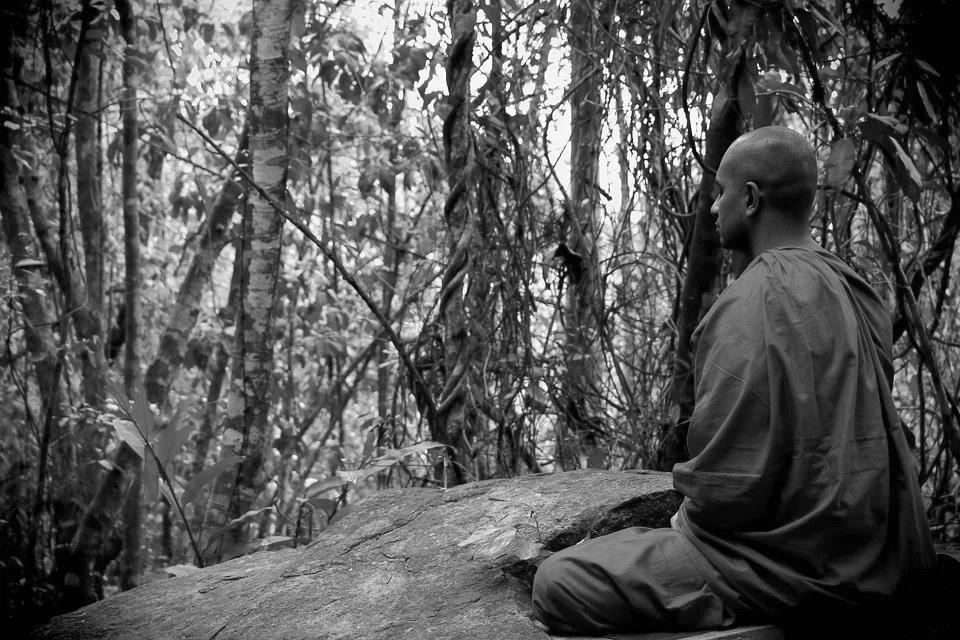
Despite the fact that we may read in the texts or hear in a Dhamma talk that there are hidden hindrances that must be sought out and clearly exposed by concentrated acts of the analytical mind watching the mind, which strives to know and see itself fully for what it really is . . .
Despite what we secretly know about ourselves, and our attachments and shortcomings . . .
Despite the fact that we know that our lack of effort will just lead to more and more suffering . . .
Despite all of these debilitating factors, most of us cannot muster the requisite determination and energy to proceed, with diligence and mindfulness, to empower the mind with the wholesome mental nourishment needed to persist in cultivating the seed and watering the sapling—to grow and proceed along the path of wisdom. This is the result of avijja (Pali. ignorance).
This is the way of the world. And while it seems—if you go along with the common flow—to be an easy way out, it is in truth the longest and most difficult and most intensely painful route. It means taking on endless rounds of existence—the long, interminable, and terrifying way, along an interminable path of insufferable, excruciating existence. This is the unending path of samsara.
In contrast to the longest way, there is also the shortest way, as recommended by the Buddha. This way is by penetrating straight through the hindrances with mind-motivated power and energy, until the raft of the mind is no longer necessary. But this way is not for everybody—at least not for now.
The path you choose to take depends on you alone.
Indeed, to attain the goal described by the Buddha, we must undergo a long and arduous process of purification that may take many years, or even a lifetime or more, of one-pointed concentrated, constant attention and effort. Focused attention directed to catch and refine away momentary negative intentions and actions of the mind—catching them as they arise, and gradually eliminating them, to the point that there is nothing negative left to arise. All that remains, then, may be compared to a dying ember; the remnants of the final weak impulse of worldly craving, extinguished and finally going out like a lamp with no oil left for fuel.
In the practice of insight meditation, the mind is wholly concentrated on the act of purifying what is arising at the moment, and may be called the “Mind Watching the Mind.” This is a process of continually attentive and wholesome mental action, through which the meditative mind develops insight into the conditions that lead to the arising impurities, which are embedded within the rock and soil of the mind. These impurities are always capable of arising and sprouting, both in the mindfully controlled meditative mind and in the uncontrolled worldly oriented mind. Both minds are seeking their own form of nourishment, good or bad, as long as the mind is still in connection with the body and the senses.
It is noteworthy that, for as long as there is still some sense consciousness present, the mind cannot be wholly purified, although the highly attuned and concentrated Mind Watching the Mind will know when and where impurity attempts to arise. The mind will therefore continue to strive to eradicate such impure impulses, tending toward achieving total purity until the Mind Watching the Mind ultimately sees only clear empty consciousness.
This is the way to eradicate impurities. Yet it is subtle and difficult to explain, and not as easy as it sounds—just as leaving the raft of the mind behind, once it has served its purpose, is also subtle and difficult to explain.
The path you choose to take depends on you alone.
Concerning the unwholesome and wholesome states of the mind, those who are experienced in the path but still within the world will know that when the body and mind get together and make contact (Pali: phassa), they more often than not end up in some sort of mischief. For this reason, they need to be constantly and carefully monitored by a skillful, heedful, attentive mind, every moment, day and night, until the cause for mischief declines and ceases to the point at which the opposite begins to arise.
As unwholesome states subside, as they are relinquished and set aside, we arouse wholesome states. These take their place and not only give the mind a much-needed respite from the wasteful burning of heated energy, but also allow the mind to dwell in cooling and curative states of mental healing.
Yet there is more to the mind than just hotly arising unwholesome mental states. There are also wholesome and even sublime states, which we may eventually attain.
Concerning insight meditation, some of us are already skilled in concentration on the path. Some are practicing and increasing insight and gradually purifying their minds, and some are just beginning.
Those who are at the very beginning should start by noting the arising of mental impurities leading to resultant irritations. This practice will gradually begin to become more focused, and clarify what would otherwise be clouded, irritated states of mind caused by unwise cravings. Those who are already on the path will be motivated to continue with right concentration once they begin to see the positive effects of their practice in the development of insight and even of wisdom.
The main point about body-mind is that the meditative mind—the Mind Watching the Mind—separates and filters out and refines the usual arising perceptions and consciousness that lead to unskillful attachments to physical and mental objects.
In summary, in the skillful meditator, the mind observes and watches arising contacts with physical and mental objects constantly, all the while carefully guarding the doors of the senses. In this way, the meditator slowly becomes more and more capable of controlling any unwholesome, delusive compulsions that may arise out of dependent feelings and emotions through the workings of consciousness and attachments.
Related features from BDG
On Mind and Body
The Mind Refining the Mind
Doing What Has to Be Done












